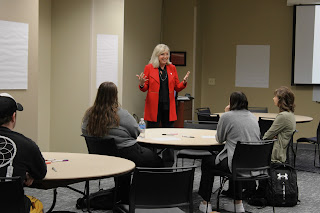Unlocking Your Full Potential: Becoming Coachable in the Business World
Unlocking Your Full Potential: Becoming Coachable in the Business World
By: Juliana Hill
In the fast-paced and competitive landscape of the business world, personal development and self-awareness have become paramount. To navigate this complex environment successfully, one must not only identify their strengths and weaknesses but also understand their intrinsic worth. Today, I had the privilege of attending a transformative talk by an exceptional speaker, Lynda Foster, graciously sponsored by Truist Financial Corporation as part of the Davis College of Business and Economics' Truist Leadership Program. Lynda shed light on these aspects, guiding us through the process of self-discovery. The event was a journey into the realm of being coachable, understanding the DISC assessment, and determining our worth in the business world.
The Speaker
Lynda Foster, a seasoned business coach and a trailblazer in her field, has spent years helping individuals and organizations reach their full potential. She shared her invaluable insights on the significance of being coachable, emphasizing the idea that personal growth and adaptability are keys to success. She provided a roadmap for harnessing one's unique abilities and fostering a growth mindset.
Being Coachable
To become coachable is to embrace change and improvement willingly. She emphasized that coachability is not just a trait but a skill that can be developed. She highlighted the importance of open-mindedness, humility, and the willingness to learn from both successes and failures. In a world that is constantly evolving, the ability to adapt and learn is a competitive advantage that should not be underestimated.
Discovering Your Strengths and Weaknesses
We were introduced to the DISC assessment, a powerful tool used to identify an individual's behavioral traits. The DISC model categorizes people into four primary personality types:
- Dominance (D): Individuals with dominant traits are assertive and results-oriented.
- Influence (I): Those with influential traits are sociable, expressive, and persuasive.
- Steadiness (S): Steadiness signifies stability, patience, and a strong focus on teamwork.
- Conscientiousness (C): Conscientious individuals are analytical, precise, and detail-oriented.
Understanding our DISC profile allows us to uncover our inherent strengths and weaknesses. For instance, a person with a high D score might seem to excel in leadership roles but may need to work on their patience and empathy. Recognizing these traits helps individuals tailor their approach to different situations, whether it's leading a team, collaborating on a project, or dealing with clients and customers.
Determining Your Worth
Beyond identifying strengths and weaknesses, our speaker emphasized the importance of understanding one's self-worth in the business world. She highlighted that your worth isn't solely determined by your skills or job title. Instead, it's a culmination of your values, experiences, and the impact you make on others. It's about recognizing your unique contributions and how they align with your personal and professional goals.
To help us determine our worth, the speaker encouraged us to ask questions like:
- Are you willing to go through failures to get to success?
- How have I positively influenced the people and organizations I've interacted with?
- What kind of legacy do I want to leave in my professional journey?
By answering these questions, we can gauge our worth beyond superficial metrics and redefine our success in a more holistic way.
In conclusion, Foster's talk was a transformative experience that inspired us to become more coachable, recognize our strengths and weaknesses using the DISC assessment, and determine our worth within the business world. It was a reminder that self-awareness and adaptability are the cornerstones of success in today’s competitive landscape. By embracing these principles, we can unlock our full potential and become true leaders in our respective fields, making a lasting impact on the world around us.
About the Speaker
Lynda McNutt Foster is an accomplished executive coach, consultant, and master facilitator with a proven track record of developing agile and humane regional and global leadership teams. Her expertise extends to improving the triple bottom line through predictive people analytics and scientifically validated processes. Lynda is also a Conversational Intelligence and Emotional Quotient Certified Coach, Certified Trainer, and Coach of 3 Vital Questions/TED - The Empowerment Dynamic. She has created innovative programs such as the Cortex Leading a Winning Team coursework® and the EPIC Leadership program for young professionals®, aimed at nurturing leadership skills and empowering individuals to excel in their careers. Lynda McNutt Foster has been recognized as a Business Icon by Valley Business Front magazine and is the co-author of "A Leader's Guide to Getting More, Fresh, Higher Quality Ideas from Their Teams" and the author of "Time Mastery: 7 Simple Steps to Richer Outcomes." As a Forbes Contributor, she shares her insights and expertise with a broader audience, making her a sought-after authority in the field of leadership and personal development.
About the Truist Leadership Program
In the academic year 2019-20, the Davis College of Business and Economics proudly launched the Truist Leadership program, made possible through a generous contribution from the Truist Financial Corporation. The core objective of this program is to imbue ethical leadership principles within the student body by means of a diverse array of purpose-driven activities.
The program operates under the diligent oversight of a dedicated full-time faculty member, currently held by Dr. Ben Biermeier-Hanson, who also holds the esteemed title of Truist Leadership Faculty.
Structured with a deliberate design, the program endeavors to instill essential leadership attributes in students through a well-rounded portfolio of annual activities. These initiatives encompass various dimensions, including student training, external engagements, student mentorship, and the integration of ethical leadership concepts into the broader university curriculum.
The program effectively fulfills its mission through four primary activities:
Truist Leadership Symposium: Held annually in the Fall, this symposium extends invitations to senior leadership figures from organizations celebrated for their unwavering commitment to corporate social responsibility. These distinguished guests visit the campus to engage with senior leadership, faculty, staff, and students. The event spans two days and incorporates guest lectures within various courses, and special meetings with faculty and staff, culminating in a lunch symposium that actively involves members of the community.
"Emerging Leaders Certificate" Training: On a semester basis, students from across Radford University are offered the invaluable opportunity to obtain the "Emerging Leaders Certificate." This certification, provided by the Truist Leadership Institute, is facilitated by the Truist Leadership Faculty. Successful completion of this training grants students industry-recognized certification credentials prior to their graduation.
Course Development Grants: In every Spring semester, the program extends course development grants to faculty members across the university. These grants are intended to encourage the infusion of ethical leadership and social responsibility principles into their courses. During Spring 2021, the program awarded four-course development grants for courses such as "Leadership for a Better World" (CLP 200) offered by the Citizen Leaders Program, "Multicultural Marketing" (MKTG 471) offered by the Department of Marketing, "Changing the World" (POCS 130) offered by the Department of Political Science, and "Leadership in Counseling" (COED 600) offered by the Department of Counselor Education.
"Please note: Generative AI tools were used in formatting this document; however, human judgment and oversight were also utilized to write the document itself and the components."




Comments
Post a Comment